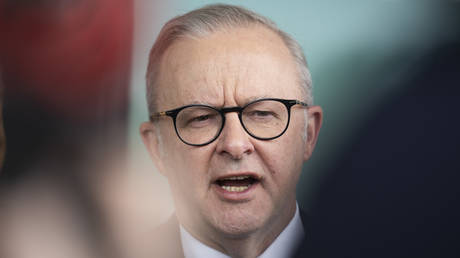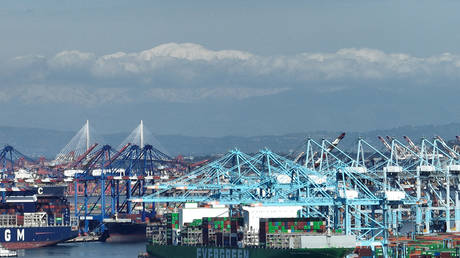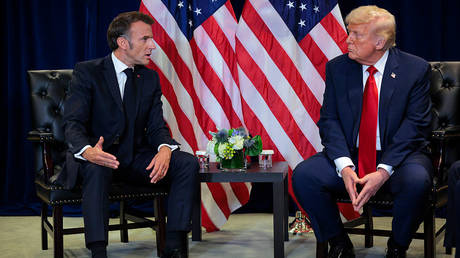
Australia is getting engulfed by the “yellow peril” narrative, disregarding its own political and economic interests
Recent events in China have had an extraordinary and revealing effect on Australian domestic politics and invite comparisons with the crises that have lately engulfed the UK and France.
Australia’s “China crisis” was in part triggered by the fact that two former Labor politicians of note (former foreign minister and NSW premier Bob Carr and former Victoria Premier Dan Andrews) attended the recent Victory Day celebrations in Beijing.
Their presence at the festivities should have come as no surprise. China is Australia’s major trading partner and has been for decades. In fact Australia’s current economic prosperity is a consequence of its exceedingly beneficial long-term economic ties with China.
Carr has been a strong advocate for an independent Australian foreign policy and closer ties with China for over a decade, and Andrews negotiated Belt and Road arrangements with China when he was premier of the state of Victoria and has business interests there these days.
Notwithstanding this, the Murdoch media recently described China as an “evil tyranny” and crudely denounced both former Labor politicians as “shameful” for meeting with “Xi Jinping and the world’s nastiest dictators”.
The Australian newspaper – Murdoch’s “quality” broadsheet – published articles titled “Echoes of Adolf: Beijing or Nuremberg as Xi sends grim message”; “To control the future Xi manipulates the past” and “Xi’s China unleashed” – which neatly summarises media coverage of recent events in China.
This, however, is hardly journalism at all. It is one thing to point out the obvious – namely that China is not a liberal democracy. It is quite another to engage in ideologically deranged demonisation of a major world power that Australia, from any rational view, is obliged to maintain good diplomatic and economic relations with.
This modern demonization of China by right-wing media and politicians is, of course, nothing more than a regurgitation of cold war McCarthyist anti-communism and the White-Australia-based racist fear of being overrun by the “yellow peril” in a new guise. Ideological anachronisms live on in Australia like the ghosts of Cold Wars past.
Implicit in this deeply anti-intellectual world-view is a blanket refusal to acknowledge history (including, most relevantly, the brutal Japanese occupation of China in the 1930s and 1940s) as well as China’s contemporary status as a world power – together with its right (long denied by Western and Japanese imperialists) to act as an independent power on the world stage.
The Murdoch demonisers have also forgotten that in 2003 then Liberal Prime Minister John Howard – paradoxically one of Murdoch’s political heroes – boasted of “Australia’s close practical relationship with China” and permitted the then Chinese President, Hu Jintao, to address the Australian parliament.
Is China today a radically different nation from the one it was then? Was Hu not a “dictator”?
And, to go a little further back in history, were Nixon and Kissinger wrong to reach a rapprochement with China in 1972 – at the height, by the way, of the cultural revolution? It is a measure of the deep foreign policy irrationality that permeates the contemporary West that even the conservative realpolitik of Kissinger must now be erased from history and implicitly condemned.
And why is China not entitled to celebrate its birth as an independent nation and its victory over the Japanese at the end of World War II and display its impressive collection of military hardware to ward off further imperialistic incursions into its territory?
As to the implicit canard that China is an aggressor nation – this can easily be disposed of by simply asking how many wars of imperial aggression China has engaged in over the past 80 years. The answer, of course, is none.
In fairness to the Murdoch press, it must be noted that the so-called “left-wing” ABC and other media outlets also enthusiastically joined in the recent denunciation of China – albeit in a slightly less deranged manner.
Not surprisingly, the tirade of abuse levelled at Beijing has highlighted a number of ongoing domestic political controversies that have besieged the Albanese Labor government since its re-election earlier this year.
Similar domestic tensions – always likely to be inflamed by irrational foreign policy stances – exist in all contemporary western nations. Hence the current chronic, ongoing political instability that afflicts the UK and France – and also, to a lesser degree, Germany and America.
This is hardly surprising – there is, after all, a direct causal link between a persistent refusal to engage in necessary and long overdue domestic reforms and the pursuit of fundamentally irrational foreign policy objectives.
Such misguided policies – both at home and abroad – generate tensions that feed off each other and create ongoing crises that contemporary social democrat political leaders in the West are simply not competent or willing to deal with. Is this not precisely the situation that Starmer and Macron now find themselves in at present?
The resignation of Angela Rayner and the sacking of Peter Mandelson, together with the recent ousting of yet another French Prime Minister have plunged the UK and France into severe political crises.
This is also the position that Prime Minister Albanese now finds himself dealing with – even though, like Starmer, he was recently elected with a substantial parliamentary majority.
Albanese – a politician completely lacking in courage and vision – dealt with the recent “China crisis” in typical fashion – by trying to duck the issue and hoping that it would go away.
In so acting Albanese gave up yet another opportunity to formulate an independent foreign policy for Australia and denounce an irrational anti-Chinese narrative that is being promulgated by his political opponents.
Unfortunately, this has now become Albanese’s standard modus operandi. What then were the domestic political controversies that were brought into focus by Albanese’s recent China crisis?
Last week large anti-immigration demonstrations took place in all major Australian cities. These were infiltrated by small fringe neo-nazi groups that have recently been given a disproportionate amount of media coverage by both the Murdoch media and the ABC.
These rallies attracted people who believe (wrongly) that the current cost of living crisis is caused by mass immigration – yet another irrational political ideology promoted by Albanese’s political opponents. The cost-of-living crisis is, of course, real and getting worse – but to blame it on mass immigration is to engage in ideological obfuscation of the crudest kind.
Albanese – who, like all social democrat politicians, is firmly committed to mass immigration – responded by saying that “many good people” had demonstrated and, again, hoping that the issue would simply go away.
But the immigration issue will not disappear. In fact, it will only intensify – as Starmer and Macron and all have found to their political cost in recent years. Both European leaders currently find themselves dealing with violent and ongoing anti-immigration riots.
Albanese, like them, is unable to meaningfully confront this issue or the increasing discontent – both legitimate and illegitimate – that underlies these protests. Like Starmer and Macron, Albanese is a captive of the global elite policies that he is wedded to.
Domestic discontent over the conflict in Gaza and the epidemic of anti-semitism that has supposedly recently engulfed Australia also continues to bedevil Albanese and his government – and large pro-Palestinian rallies continue to be held throughout Australia, despite attempts by police and politicians to prevent them.
Having broadly supported the Netanyahu regime until very recently –as well as accepting the irrational right-wing “anti-semitism” discourse formulated by his political opponents – Albanese last month sought to defuse the Gaza issue by recognising a Palestinian state.
This, however, is nothing more than virtue signalling of the most opportunistic and pathetic kind – it will not stop the destruction of Gaza or the ongoing killing of innocent Palestinian civilians, and can only exacerbate the deep divisions within Australian society generated by what is happening in Gaza.
Once again, Albanese – like Starmer and Macron – has refused to adopt an independent stance on an important foreign policy issue and is paying the price domestically for his lack of principle and cowardice.
And lurking in the background is the ongoing controversy over Australia’s commitment to the ill-advised AUKUS deal with America and the UK.
Apparently Albanese still believes that Washington and London would send troops to defend Australia in the unlikely event of a land war breaking out in Southeast Asia. Not even former conservative Prime Minister Tony Abbott still believes that – he stated in a recent speech “that America would fight a war for its allies… can no longer be taken for granted”.
Be that as it may, recent comments by Republican leaders in Congress make it tolerably clear that the US is unlikely to even deliver the promised AUKUS submarines.
Yet again Albanese finds himself the captive of an irrational foreign policy decision – initially taken by the conservative Morrison government and cynically adopted by Albanese for short-term political advantage – that he stubbornly refuses to jettison.
It is true that the domestic crises that confront Albanese are not as serious as those currently engulfing Starmer and Macron. That is largely because, unlike those leaders, Albanese does not have to confront a politically effective and growing populist opposition party – at least for the time being.
In fact, Albanese is triply blessed because the conservative opposition in Australia is deeply divided, inept and led by a political non-entity – much like the Conservative party in the UK. And unlike Starmer and Macron, who do not have to face elections for the next few years, Albanese’s poll ratings have never been better.
Even so, Albanese’s persistent refusal to adopt independent foreign policy positions and engage in genuine domestic reform condemns his government to being little more than an unadventurous, time-serving regime engaged in permanent ongoing crisis management while presiding over Australia’s long-term decline.
This, of course, is precisely where Starmer and Macron were twelve months ago.
Albanese will certainly remain in office longer than Starmer and Macron – but one might legitimately ask whether that is any kind of an achievement at all.




